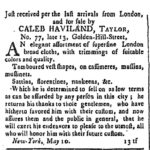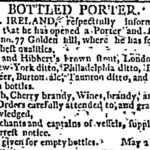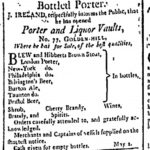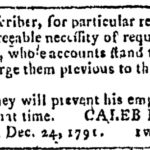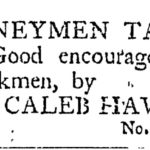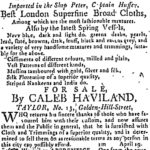It will soon be two years since I posted about the porter store house of Caleb Haviland at 77 John Street in the New York City of 1798. For some reason, I am very fond of the guy and his fabulous range of drinks from both the old and new homelands. Six English ales alone were on offer – Burton, Taunton, Liverpool, Gainsborough, Dorchester and Bath. Yum. Happy, then, was I to find a tidbit more.
If you look up there to the right you will see a notice placed in the Weekly Museum of 17 May 1794 you will see Caleb Haviland offering his services as a tailor at 77 Golden Hill Street in New York City. Interesting to note that number 77 used to be numbered as 13. Then, in the middle, you will see Joseph Ireland in the New York Daily Advertiser of 12 May 1795 offering an interestingly similar range of beers. In addition to London, New York and Philadelphia Porter, there was Billington’s beer as well as Burton, Taunton and Bristol ale. The address, again, is 77 Golden Hill. Another notice placed in the New York Gazette of 20 July 1795 is up there to the left. Again, at 77 Golden Hill.
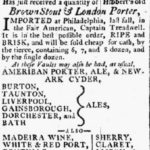 I equally all a’shiver over the reference to Golden Hill. If you look to the left, you will see the notice I published in the post from September 1798 in the New York Gazette. It describes the address as “77 John Street (late Golden Hill).” John Street is still there. It is two streets to the north of and parallel to Maiden Lane where the Rutgers brewed for many decades in the 1700s. Crossing these two streets is still Gold Street where the elusive Medcef Eden also brewed in the 1770s to the 1790s. Golden Hill was once the highest spot on Manhattan as well as the site of a 1770 clash between the British and locals. It was not golden because of the grain, however, but because of the yellow flowers that grew there when the Dutch arrived in the early 1620s.
I equally all a’shiver over the reference to Golden Hill. If you look to the left, you will see the notice I published in the post from September 1798 in the New York Gazette. It describes the address as “77 John Street (late Golden Hill).” John Street is still there. It is two streets to the north of and parallel to Maiden Lane where the Rutgers brewed for many decades in the 1700s. Crossing these two streets is still Gold Street where the elusive Medcef Eden also brewed in the 1770s to the 1790s. Golden Hill was once the highest spot on Manhattan as well as the site of a 1770 clash between the British and locals. It was not golden because of the grain, however, but because of the yellow flowers that grew there when the Dutch arrived in the early 1620s.
If we can get back to Caleb, you will see to the left that Christmas 1791 was a bit grim, as he need to squeeze his customers and even threatens legal action in a notice dated 24 December 1791 placed in the New York Gazette. In the middle, things look happier as according to The Diary of 31 May 1792 he is looking for journeymen to work in his shop. But by 30 April 1793, according to the New York Gazette, things are booming as he is bringing in fine… no superfine cloth of all sorts and looking for an apprentice as long as they are from the country. You know what city folk are like.*
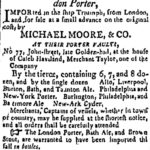 Then, in the wonderfully named periodical The Minerva, also of New York, dated 9 January 1797 we have this. A notice for the fluid goods for sale by Michael Moore & Co. located at No 77 John Street, late Golden Hill. He has taken over the business of Joseph Ireland, hopefully now staffed by steady sober folk. The trade is identified being undertaken at the house of Caleb Haviland, merchant tailor, who is also identified as one of the company. Things are progressing so well, Haviland is joining into new ventures in the town with others – and promising the delivery soon of imported bottles of London Porter, Bath Ale and Brown Stout. Fabulous.
Then, in the wonderfully named periodical The Minerva, also of New York, dated 9 January 1797 we have this. A notice for the fluid goods for sale by Michael Moore & Co. located at No 77 John Street, late Golden Hill. He has taken over the business of Joseph Ireland, hopefully now staffed by steady sober folk. The trade is identified being undertaken at the house of Caleb Haviland, merchant tailor, who is also identified as one of the company. Things are progressing so well, Haviland is joining into new ventures in the town with others – and promising the delivery soon of imported bottles of London Porter, Bath Ale and Brown Stout. Fabulous.
By the publication of the New York Gazette on 14 June 1797, Haviland is dissolving what had become a partnership with Mr. Moore and was away to the races, taking on the porter vault by himself and becoming the drinks merchant we met in 2015.
*Sadly, an unnamed occupant of 13 Golden Hill was running a notice for the sale of an unnamed enslaved young woman and her child, as seen in The Diary of 16 March 1793, though with the statement “sold for no fault, only want of employ.” As we have seen, slavery was common in New York in that era.

